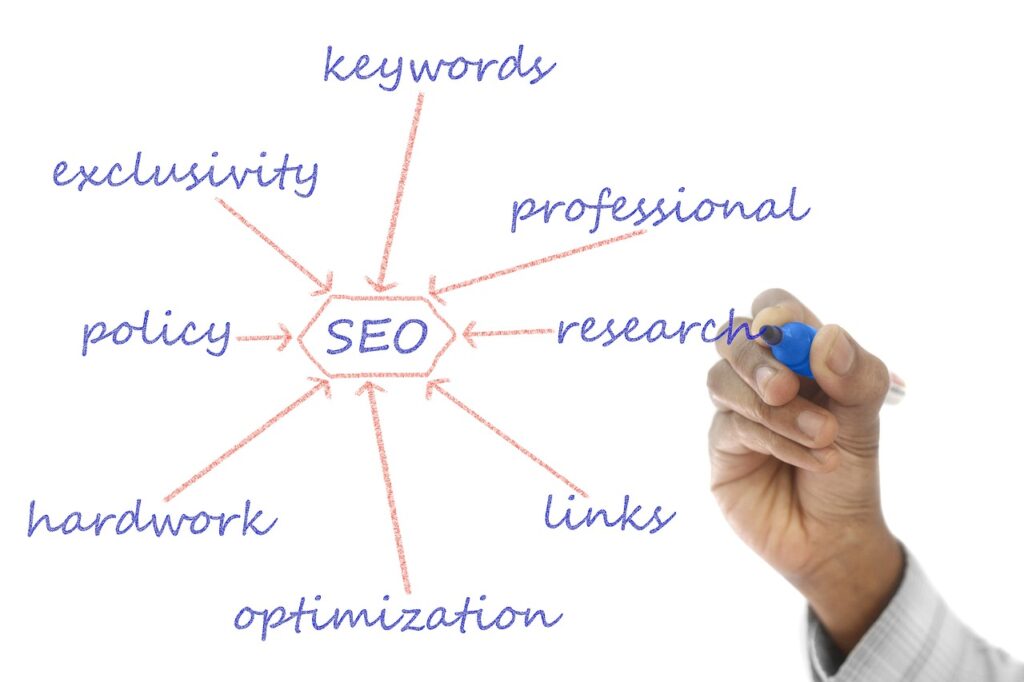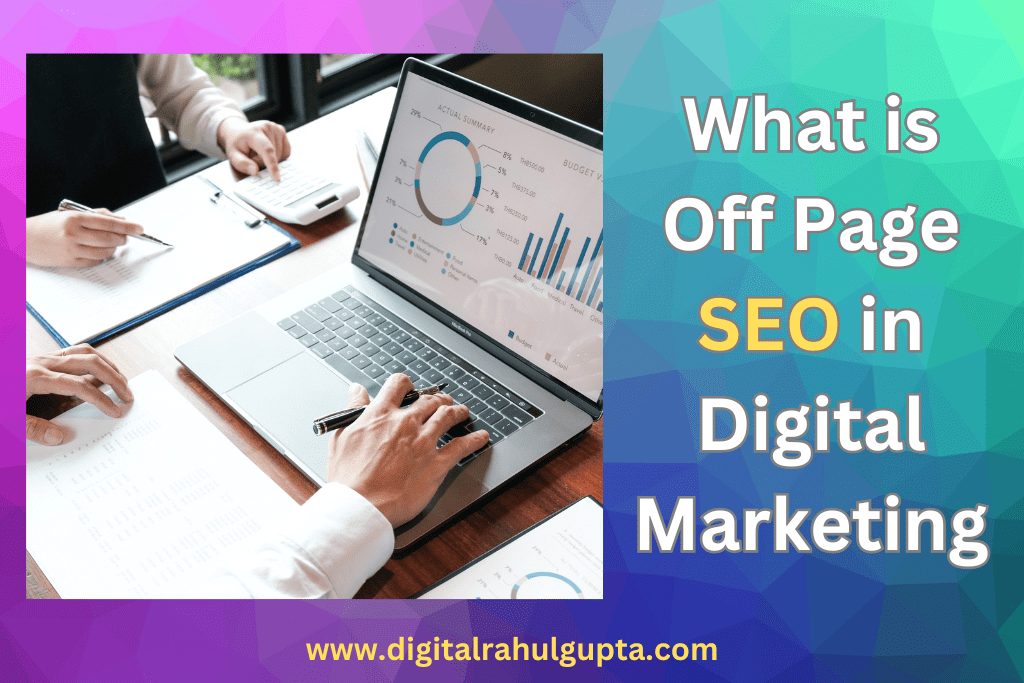In the expansive world of digital marketing, the quest for online visibility and success involves more than just fine-tuning your website. Enter Off-Page SEO, a crucial element that works behind the scenes to elevate your site’s authority and search engine rankings. If you’re ready to explore this essential component of SEO, you’ve come to the right place. Let’s dive into what Off-Page SEO is, why it matters, and how you can harness its power for your digital strategy.
Introduction to Off-Page SEO
What is Off-Page SEO?
Off-Page SEO encompasses all the actions you take outside of your own website to improve its position in search engine results pages (SERPs). Unlike On-Page SEO, which focuses on optimizing elements within your site like content and HTML, Off-Page SEO aims to build your site’s credibility and influence through external means. Think of it as your website’s reputation management, marketing, and networking efforts rolled into one.
Importance of Off-Page SEO in Digital Marketing
Why should you care about Off-Page SEO? Imagine your website as a hidden gem in a vast digital landscape. Off-Page SEO is the strategy that brings your gem into the spotlight. It’s about creating a positive online presence, building trust with search engines, and forging connections that lead to higher rankings and increased traffic.
A strong Off-Page SEO strategy can help you:
- Boost Your Search Engine Rankings: High-quality backlinks and social signals signal to search engines that your content is valuable.
- Enhance Your Online Reputation: Effective reputation management fosters trust and encourages positive reviews and mentions.
- Drive More Traffic: Social media engagement and influencer partnerships can direct visitors to your website.
- Build Brand Authority: Consistent efforts in content marketing and link building establish you as an authority in your field.

Understanding the Basics of SEO
On-Page vs. Off-Page SEO
SEO can be divided into two main categories: On-Page and Off-Page. On-Page SEO focuses on what you do within your site, such as keyword optimization, content quality, and site structure. Off-Page SEO, on the other hand, encompasses strategies and efforts that take place outside your website.
On-Page SEO:
- Keyword Research
- Content Creation
- Meta Tags
- Internal Linking
- User Experience
Read Also: What is on page SEO in Digital Marketing
Off-Page SEO:
- Link Building
- Social Media Marketing
- Influencer Outreach
- Content Marketing
- Online Reputation Management
While On-Page SEO lays the foundation for your site, Off-Page SEO builds the bridges that lead users and search engines to your site.
How Off-Page SEO Complements On-Page SEO
Think of On-Page SEO as the meticulous construction of your website’s interior—designing beautiful spaces and arranging content for maximum impact. Off-Page SEO is the strategic positioning of your website in the broader digital marketplace. Together, they create a powerful SEO strategy where:
- On-Page SEO ensures your site is well-optimized and user-friendly.
- Off-Page SEO helps your site gain recognition, trust, and authority from external sources.
Key Components of Off-Page SEO
Link Building
Link building is the heart of Off-Page SEO. It involves acquiring backlinks from other websites to your own. High-quality backlinks act as endorsements from other sites, telling search engines that your content is valuable.
- Importance of Backlinks: Backlinks are like votes of confidence for your website. They show search engines that other reputable sites endorse your content.
- Types of Backlinks:
- Editorial Backlinks: Links within content from other reputable sites.
- Guest Blogging Links: Links from posts you write for other blogs.
- Social Media Links: Shares and mentions on social media platforms.
- Techniques for Acquiring Quality Backlinks:
- Create compelling content that others want to link to.
- Reach out to influencers and bloggers for guest posting opportunities.
- Engage in partnerships and collaborations with other businesses.

SEO in Digital Marketing: A Comprehensive Guide
Social Media Marketing
Social media platforms are more than just a place to share updates. They’re a vital tool for Off-Page SEO.
- Role of Social Media in Off-Page SEO: Social media can drive traffic to your site, generate backlinks, and increase brand awareness.
- Strategies for Effective Social Media Engagement:
- Post consistently and share valuable content.
- Engage with your audience through comments and messages.
- Use hashtags and tag relevant accounts to increase reach.
- Measuring Social Media Impact on SEO:
- Track metrics like referral traffic, engagement rates, and share counts using tools like Google Analytics and social media analytics platforms.
What is Social Media Marketing? A Comprehensive Guide
Influencer Marketing
Influencer marketing leverages the power of influencers to boost your brand’s presence.
- What is Influencer Marketing?: It’s a strategy that involves collaborating with influential individuals to promote your brand.
- Benefits of Influencer Marketing for SEO:
- High-quality backlinks from influential sites.
- Increased brand visibility and credibility.
- Drive targeted traffic to your website.
- How to Collaborate with Influencers:
- Identify influencers in your niche with engaged audiences.
- Reach out with a personalized proposal.
- Offer value in exchange for their promotion of your content.
Content Marketing for Off-Page SEO
Creating and distributing valuable content is crucial for Off-Page SEO.
- Creating Shareable Content:
- Focus on quality, relevance, and originality.
- Use engaging formats like infographics, videos, and blog posts.
- Guest Blogging:
- Write high-quality guest posts for reputable blogs in your industry.
- Provide valuable insights and include relevant backlinks.
- Content Distribution Channels:
- Share your content on social media, forums, and content syndication sites.
Online Reputation Management
Maintaining a positive online reputation is essential for Off-Page SEO success.
- Importance of Online Reputation:
- A positive reputation fosters trust and encourages positive reviews.
- Strategies for Managing Online Reputation:
- Monitor mentions of your brand.
- Respond to reviews and feedback professionally.
- Tools for Monitoring Online Presence:
- Google Alerts
- SEMrush
- Mention
Measuring Off-Page SEO Success
To ensure your Off-Page SEO efforts are paying off, track key metrics and adjust strategies as needed.
- Key Metrics to Track:
- Domain Authority
- Number and Quality of Backlinks
- Social Media Engagement
- Referral Traffic
- Tools for Measuring Off-Page SEO Performance:
- Ahrefs
- Moz
- SEMrush
- Analyzing and Adjusting Strategies:
- Regularly review performance metrics.
- Adapt your strategies based on what’s working and what’s not.
Common Mistakes in Off-Page SEO
Avoid these common pitfalls to ensure your Off-Page SEO efforts are successful.
- Avoiding Black Hat SEO Techniques:
- Do not engage in practices like buying links or using link farms.
- Common Pitfalls and How to Avoid Them:
- Focus on quality over quantity.
- Stay updated with SEO best practices and avoid outdated techniques.
Future Trends in Off-Page SEO
The world of SEO is always evolving. Stay ahead by keeping an eye on future trends.
- Emerging Trends to Watch:
- AI and machine learning in SEO.
- The rise of voice search.
- Increasing importance of mobile-friendly content.
- Adapting to Changes in the Digital Landscape:
- Be flexible and ready to adjust your strategies as new trends emerge.
Conclusion
Off-Page SEO is a multifaceted and dynamic field that plays a crucial role in your overall digital marketing strategy. By focusing on link building, social media engagement, influencer partnerships, and online reputation management, you can enhance your site’s authority and visibility.
Recap of Key Points:
- Off-Page SEO involves efforts outside your site to boost rankings.
- It complements On-Page SEO to create a robust SEO strategy.
- Key components include link building, social media marketing, influencer outreach, and content marketing.
Final Thoughts on Off-Page SEO: Embrace Off-Page SEO as a vital part of your digital marketing efforts. It’s not just about external signals but about creating a lasting, positive presence in the digital world.
FAQs
What is the difference between on-page and off-page SEO?
On-Page SEO focuses on optimizing your website’s internal elements, while Off-Page SEO involves external strategies to build your site’s authority and credibility.
How long does it take to see results from off-page SEO?
Typically, it takes several months of consistent effort to see significant improvements in search engine rankings and traffic.
Can social media really impact SEO?
Yes, social media can indirectly impact SEO by driving traffic, increasing brand awareness, and generating backlinks.
Is link building still relevant in 2024?
Absolutely! Link building remains a crucial element of Off-Page SEO, helping to build authority and improve rankings.
How do I find the best influencers for my brand?
Look for influencers in your niche with engaged audiences. Use tools like BuzzSumo and social media platforms to identify potential partners.
Read More: What is Digital Marketing? | How it work?
